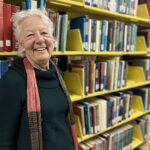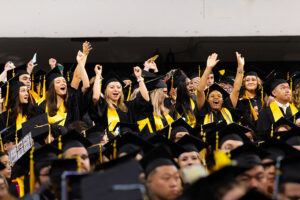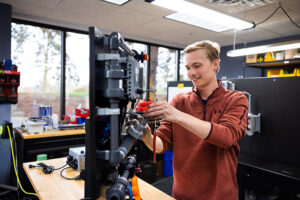Jeb Willenbring was headed along Edgewood Drive at the north edge of campus when he came across a significant barrier – the sidewalks on both sides of the street were blocked by construction. For Willenbring, a professor at the University of Wisconsin-Milwaukee, the construction presented more than the usual challenges because he is nearly blind.
However, with the help of an app called Aira, he was able to navigate out into the street and continue on his way. Aira provides people who are blind or have low vision with a virtual guide – a trained agent who picks up at the push of a button and helps guide them in unfamiliar situations. In this case, the agent also used Willenbring’s phone to take a picture of the obstructions, which Willenbring then emailed to the city’s Americans with Disabilities Act coordinator. The city quickly fixed the problem.
Now the Aira app he used is coming to UWM, free to all users, to help those who are blind or have low vision explore new locations and complete day-to-day tasks.

UWM started offering the service Sept. 1 and is the first university in the state to offer Aira to students, faculty, staff and community members, according to Shannon Aylesworth, adaptive technology specialist at UWM’s Accessibility Resource Center. The center has notified students who are visually impaired about the free service, but others who are interested in signing up for the service can contact Aylesworth at (aylessr@uwm.edu) to opt in. Please include your name, UWM email address and cell phone number.
Live agents offer help
Aira is available on any iOS or Android phone and be accessed by downloading the mobile app and completing a brief registration. As soon at the user enters an Aira access location, they will receive a notification and be able to use Aira for free while on UWM campuses or at UWM events. The app connects them with a live agent who can provide on-demand visual descriptions and guidance. Agents use real-time video and audio descriptions as well as GPS, maps and other online information to give users enhanced, efficient information for more independence, according to Aylesworth.
“I was aware of Aira and had a basic understanding of the service, but wondered how it could be used at UWM to benefit students with visual impairments,” said Aylesworth.
Aura Hirschman, chair of the campus ADA advisory committee, had also heard about Aira at conferences on disability and accessibility. Milwaukee County had already made the app available, starting in 2019, at a number of county facilities including Mitchell International Airport.
Grant gets service started
Willenbring, who serves on the advisory committee and was already using Aira, demonstrated how it worked to the campus ARC and the committee.
All agreed it would be great resource to bring to campus.
“Everybody was very supportive of it, said Hirschman. “The issue that tripped us up was who was going to pay the bill. ”
Aylesworth and Hirschman co-wrote a successful grant request to the Industries for the Blind and Visually Impaired. The grant is providing seed money to get the project started.
The university’s Accessibility Resource Center is using that funding to pay for the subscription that will allow anyone on the campuses to access the app and use the service for free through Dec. 31 2021.
The service will be available at all UWM campuses and buildings and also at UWM events held in other locations.
Helping people be independent
Industries for the Blind and Visually Impaired had been supportive in the past for other assistive technology and services to assist students, according to Aylesworth. Aira, which serves as a visual interpreter, can help students in a number of ways, she added.
“There are a couple of students that have shared with me that they are embarrassed about their vision loss and will typically walk the campus in advance and find their classrooms, so they’re not bringing attention to themselves,” Aylesworth said. “With Aira, when they use their earbuds, it’s just like any other student listening to music and they can find their classroom without calling attention to themselves.”
Aira can also offer students who’ve had to rely on family or friends to get around campus the opportunity to become more independent, Aylesworth said.
Even for those who’ve mapped out their routes around campus, the service can be helpful when unexpected obstacles pop up, she added. “When snow falls or when there’s construction, that can put up unanticipated barriers.”
Navigating webpages too
Willenbring uses the app, in combination with another one called Team Viewer, to help him when he is using computer online learning courses, which may be only minimally accessible. If he has difficulty finding a button on a page, for example, he can use Team Viewer and call up the Aira app. The agent then takes control of his computer and helps him navigate web pages and push the correct buttons.
While UWM has only a small number of blind and visually impaired students, the service opens the campus and other UWM locations and events to visitors and community members, Hirschman said. “Aira would extend to anybody coming on campus for an event, and will be available on the perimeter of the campus. There are some community members who live in proximity to the university who would be able to take advantage of the service.”
Even those who might not currently be visually impaired might later benefit, said Willenbring.
As just one example, he said, anyone who has cataracts and hasn’t had surgery yet but is having trouble reading a menu in a restaurant or reading the call number of books in the library could be helped by Aira.
“It’s for anyone at whatever stage of their life who has experienced some visual change that they’re trying to accommodate,” he added. “If they don’t need it now, they may in the future.”
The app is also an important part of letting the community and potential students with visual impairments know UWM is inclusive and is welcoming them, said Aylesworth. “We hope some high school students who are blind or visually impaired would begin to think about UWM.”







